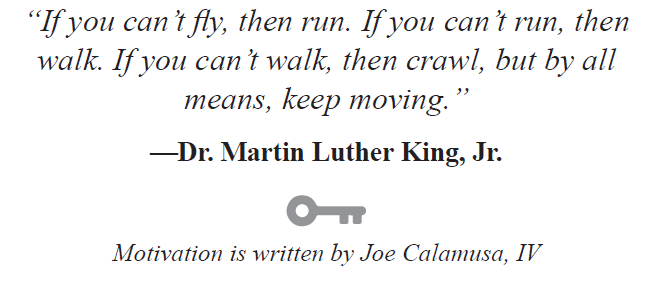Motivation



The two definitions of the noun motivation tell the multi-functional story of this multifaceted word. I begin with the second: the general desire or willingness of someone to do something. That indicates that our desire is determined, at least in part, by something we’ve been asked or decided to do. Is there a cause and effect relationship between something and our desire to do it?
Sure. We have more motivation to tackle some tasks than others. Fol- low-up question: Could we be even more successful if our willingness to do something wasn’t as influenced by the something itself? Sure. Take two tasks that equate in their contribution to our personal goals. One something
comes with a higher natural general desire to complete. It is instinctively preferable over the less-desirable something. By definition, we’ll be more motivated to accomplish the former. If we’re more motivated to accomplish it, then it stands to reason that there is at least a slight probability that we’ll pursue it with more energy and thoroughness than we will the less-preferable something.
So once we’ve completed both, our collective progress toward our personal goals is less than it would be if we have been equally motivated to complete these two equally important somethings.
That’s when the first definition of the word takes its place in the pursuit of our purpose: the reason or reasons one has for acting or behaving in a certain way. This is not the same as the second definition. This definition implies an external stimulus that is independent from the general desire of someone to do something. This definition provides us with permission to locate an external power source to increase motivation beyond our natural willingness. We need that external power source, like a backup generator, to move us to complete the less-desirable task with the same intention and intensity as the something we naturally prefer.
Even the specificity of the definition is instructive: reason or reasons. So we could even combine external sources of motivation, if need be, to give us that extra boost of power when attacking the most difficult somethings. It doesn’t matter if those reasons are intrinsic or extrinsic. It doesn’t matter if they’re intangible or tangible. It matters only that they motivate us to do our best when what we have to do would instinctively elicit less than that standard of behavior.
As I teach hundreds of students at The University of Alabama and thousands of professionals across corporate America, I find the same dividing line within each of those two diverse groups. Lines are easily drawn based on who resigns their daily regimen to their “general desire or willingness” versus those who seek the required reasons to “behave in a particular way.” Those in the latter category excel because they’re unwilling to let their own unwillingness stand in their way.
The following six strategies will help fuel your motivation:
M – Build your own motivation matrix.
O – Offer, but don’t force, your motives on others.
T – Allow time to give you the courage to take risks.
I – Motivation is inspiration with staying power.
V – Visualization is a source of self-motivation.
E –Your elevation is a function of your motivation.
Here’s a quote that captures the meaning and importance of motivation without even using the word:
